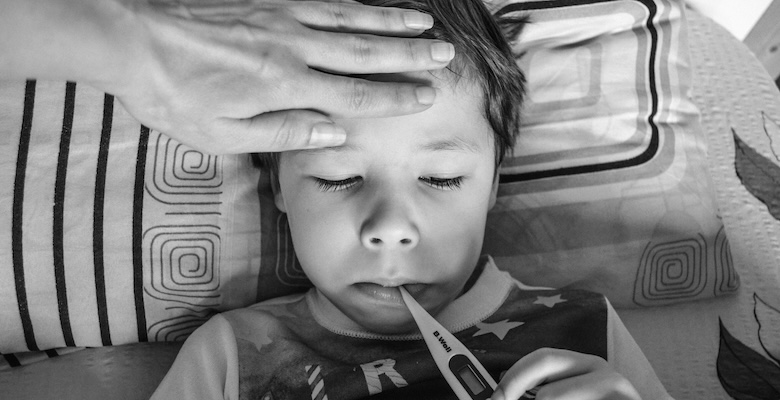Fever is one of our most common reasons for phone calls and visits, and we know that fevers can feel really scary. My goal with this blog is to share some information that will hopefully help you feel more comfortable and equipped to handle those fevers.
Let’s start with what a fever is. A fever is defined as a temperature greater than or equal to 100.4F (38C). So those temperatures of 99F or 100.3F are not true fevers. That doesn’t mean that your child isn’t sick though – it just means that they do not have a fever.
When the body detects an infection, the brain sends out a message to increase the body’s temperature. That’s how a fever starts. A common misconception is that the higher the fever the more serious the illness, but that is not always the case. There is no temperature level in and of itself that is inherently dangerous to a child (an important caveat is that a fever due to heat exposure/stroke is dangerous and is not what is being covered in this post). In fact, I often tell my families that I am much more worried about a child with a temperature of 99F who is not acting right than I am about a child who has a temperature of 104F and is acting appropriately. So when you notice your child is warm and take their temperature and see a high number, don’t panic!
How to take your child’s temperature. There are SO many thermometers on the market and there’s no one “best” one to buy. It’s important to make sure the method you use is appropriate for your child’s age and that you follow the instructions for your specific thermometer. We no longer recommend adding or subtracting degrees based on the type of method you use – the reading that your thermometer gives is the temperature you should report.
- Rectal thermometer – the most accurate way to take a temperature. Should be used for all infants under 3 months, and I recommend using it for infants up to at least 12 months old
- Forehead thermometer – can be used for any age (remember rectal is the absolute best for infants less than 3 months)
- Ear thermometer – can be used for children older than 6 months
- Oral thermometer – can be used for children older than 4 years old
- Axillary (armpit) thermometer – the least reliable method, but can technically be used for any age
When to worry? Here’s the things that should always prompt you to reach out to us:
- Fever in a baby younger than 3 months
- Signs of respiratory distress such as breathing really fast, the child’s muscles are sucking in and out between their ribs or in their neck, or the child cannot talk due to struggling to breathe
- One point to note here – fevers often cause kids to have faster breathing, almost like they are panting. If this is the only thing you see and it resolves as the fever comes down then that would be reassuring to me
- Signs of dehydration such as significantly decreased urine output, dry lips, or a sunken soft spot in babies
- Acting/looking really sick such as things like having trouble staying awake, being extremely irritable, having trouble moving their neck or body, or not responding appropriately to you. Trust your gut here.
- Your child has an underlying medical condition that could make an infection more serious for them
How to treat the fever?
- If your child seems uncomfortable and it is appropriate for their age, then treating with acetaminophen (Tylenol) and/or ibuprofen (Motrin) is the best way to help them feel more comfortable (refer to our website for medication dosages).
- Please don’t hold off on treating their fever before you come into the office just so that we can see what they look like without medications. Acetaminophen or ibuprofen is not going to mask a serious infection or impede our ability to make a correct diagnosis – delaying medications is only going to delay helping them feel better.
- If they don’t seem uncomfortable, then you don’t have to automatically treat with medications
- Push fluids. Kids with fevers are more prone to getting dehydrated
- Don’t over bundle them, keep them in light clothing
Finally, please remember that our nurses and doctors are here 24/7 to talk with you about your child’s fever if you have questions or are worried. When in doubt, just call us because we want to help!

